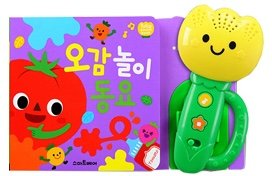 Image 1 of 2
Image 1 of 2

 Image 2 of 2
Image 2 of 2



Tulip Sensory Play Nursery Rhymes 튤립 오감 놀이동요
튤립 오감 놀이동요 is an interactive music album designed to stimulate and engage children's senses through playful songs and activities. Featuring a range of lively tunes and sensory-rich experiences, this collection encourages kids to explore their five senses—sight, sound, touch, taste, and smell—while dancing, clapping, and moving to the music. The vibrant rhythms and engaging lyrics not only entertain but also support sensory development and motor skills in a fun and educational way.
Listening to nursery songs and reading picture books with musical elements are highly beneficial for babies, young children and children with delayed speech.
Language Development: Nursery songs and rhymes often use repetitive patterns and rhythmic structures that help babies and toddlers learn language. The melodic and rhythmic elements make language more engaging and memorable, aiding in vocabulary development and phonemic awareness (the ability to hear and manipulate the smallest sounds in words).
Cognitive Development: Music stimulates various areas of the brain involved in processing language, emotion, and pattern recognition. When children listen to nursery songs and participate in musical activities like singing along or clapping to the beat, they are engaging their cognitive abilities, improving their memory, attention span, and overall cognitive skills.
Emotional Development: Music has a powerful impact on emotions. Nursery songs often convey simple emotions like joy, comfort, or excitement, which helps children understand and express their feelings. Singing and dancing to music can also be a soothing and comforting experience for children, promoting emotional regulation and bonding with caregivers.
Social Development: Singing nursery songs and participating in musical activities often involve interaction with caregivers or other children. This interaction fosters social skills such as turn-taking, cooperation, and listening to others. Singing together creates a sense of community and shared experience, enhancing social connections.
튤립 오감 놀이동요 is an interactive music album designed to stimulate and engage children's senses through playful songs and activities. Featuring a range of lively tunes and sensory-rich experiences, this collection encourages kids to explore their five senses—sight, sound, touch, taste, and smell—while dancing, clapping, and moving to the music. The vibrant rhythms and engaging lyrics not only entertain but also support sensory development and motor skills in a fun and educational way.
Listening to nursery songs and reading picture books with musical elements are highly beneficial for babies, young children and children with delayed speech.
Language Development: Nursery songs and rhymes often use repetitive patterns and rhythmic structures that help babies and toddlers learn language. The melodic and rhythmic elements make language more engaging and memorable, aiding in vocabulary development and phonemic awareness (the ability to hear and manipulate the smallest sounds in words).
Cognitive Development: Music stimulates various areas of the brain involved in processing language, emotion, and pattern recognition. When children listen to nursery songs and participate in musical activities like singing along or clapping to the beat, they are engaging their cognitive abilities, improving their memory, attention span, and overall cognitive skills.
Emotional Development: Music has a powerful impact on emotions. Nursery songs often convey simple emotions like joy, comfort, or excitement, which helps children understand and express their feelings. Singing and dancing to music can also be a soothing and comforting experience for children, promoting emotional regulation and bonding with caregivers.
Social Development: Singing nursery songs and participating in musical activities often involve interaction with caregivers or other children. This interaction fosters social skills such as turn-taking, cooperation, and listening to others. Singing together creates a sense of community and shared experience, enhancing social connections.

